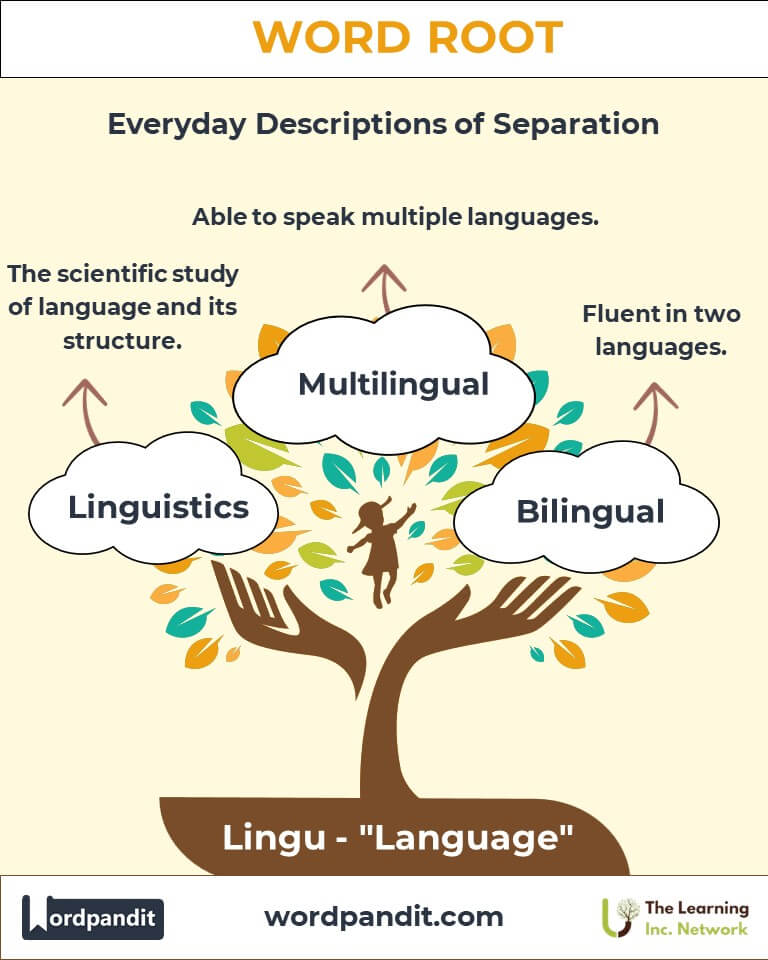Lingu: The Root of Language and Communication
Discover the profound significance of the root "lingu," derived from Latin, meaning "language" or "tongue." From fields like linguistics to cultural expressions in multilingual societies, this root forms the foundation of how we understand, express, and connect through words.

Table of Contents
- Introduction: The Essence of "Lingu"
- Etymology and Historical Journey
- Mnemonic: Unlocking the Power of "Lingu"
- Common Lingu-Related Terms
- Lingu Through Time
- Lingu in Specialized Fields
- Illustrative Story: "Lingu" in Action
- Cultural Significance of the Lingu Root
- The Lingu Family Tree
- FAQs About the Lingu Word Root
- Test Your Knowledge: Lingu Word Root Quiz
- Conclusion: The Living Legacy of "Lingu"
Introduction: The Essence of "Lingu"
Have you ever wondered how language shapes our world? The root "lingu," derived from the Latin word lingua, meaning "tongue" or "language," lies at the heart of human expression. Whether it’s in understanding linguistic structures or celebrating multilingualism, this root connects words, cultures, and ideas. Pronounced as "ling-gwoo" (in Latin) or "ling-goo" (in English terms), "lingu" permeates everyday life and advanced academic disciplines alike.

Etymology and Historical Journey
The root "lingu" traces back to the Latin lingua, literally meaning "tongue" but figuratively extended to "speech" or "language." Ancient Romans recognized the tongue's centrality in articulation, making lingua synonymous with communication. As Latin evolved into the Romance languages, "lingua" transformed into French (langue), Spanish (lengua), and Italian (lingua), influencing English vocabulary in the process.
- The introduction of "linguistics" in the 19th century, formalizing the study of language structures.
- The rise of multilingual societies during colonial expansions, spreading lingu-rooted terms worldwide.
Mnemonic: Unlocking the Power of "Lingu"
To remember "lingu," picture a tongue speaking multiple languages or creating melodies of communication.
Mnemonic Device: "Let your lingu (tongue) sing through the languages it speaks."
Common Lingu-Related Terms
- Linguistics (ling-gwis-tiks): The scientific study of language and its structure.
- Example: “Linguistics explores phonetics, syntax, and semantics to understand human communication.”
- Multilingual (mul-tee-ling-gwal): Able to speak multiple languages.
- Example: “In today’s globalized world, being multilingual is a significant advantage.”
- Bilingual (bye-ling-gwal): Fluent in two languages.
- Example: “Her bilingual abilities help her navigate both Spanish and English-speaking communities.”
- Lingo (ling-go): Informal language or jargon.
- Example: “The tech industry has its own lingo, like ‘AI’ and ‘UX.’”
- Lingual (ling-gwal): Pertaining to the tongue or language.
- Example: “Dentists often examine lingual surfaces of teeth for hidden cavities.”
Lingu Through Time
Linguistic Evolution:
- In medieval Europe, lingua franca referred to a common trade language.
- The rise of linguistic nationalism in the 18th and 19th centuries emphasized language as central to cultural identity.
Modern Shifts: Terms like "linguaphile" (lover of languages) highlight the growing appreciation for linguistic diversity in today’s global context.
Lingu in Specialized Fields
- Medicine:
- Lingual nerve: A branch of the mandibular nerve involved in tongue sensation.
- Relevance: Critical in surgeries and dental procedures.
- Education:
- Applied linguistics: The practical application of linguistic theories, especially in teaching languages.
- Technology:
- Natural Language Processing (NLP): The field combining linguistics and AI to enable machines to understand human language.
- Sociology:
- Sociolinguistics: Examines how language interacts with social structures.
Illustrative Story: "Lingu" in Action
Maya, a multilingual interpreter, faced a challenge when translating for a global conference. Speakers from different countries used idioms unique to their cultures. Drawing on her linguistic expertise, she conveyed their messages accurately, bridging not just languages but cultural gaps. Maya’s story reflects how "lingu" empowers connection and understanding in a diverse world.
Cultural Significance of the Lingu Root
Language is a cornerstone of culture, and the "lingu" root emphasizes its role in preserving traditions, storytelling, and identity. Festivals celebrating multilingualism, like International Mother Language Day, highlight humanity’s linguistic diversity and the unifying power of communication.

The Lingu Family Tree
Explore related roots and their connections to "lingu":
- Logos (Greek): Word, speech, or reason.
- Examples: Dialogue, Logic.
- Glotta (Greek): Tongue or language.
- Examples: Polyglot (speaking many languages).
- Verb (Latin): Word.
- Examples: Verbal, Proverb.
FAQs About the "Lingu" Word Root
Q: What does "lingu" mean?
A: The root "lingu" comes from the Latin word lingua, meaning "tongue" or "language." It forms the foundation of terms related to communication and expression.
Q: What is linguistics?
A: Linguistics is the scientific study of language, including its structure, meaning, and social use. It explores phonetics, syntax, semantics, and the historical evolution of languages.
Q: What does multilingual mean?
A: Multilingual refers to the ability to speak, read, or write in more than one language. It fosters communication between cultures and enhances cognitive skills.
Q: What is the origin of the word lingo?
A: "Lingo" is derived from lingua and originally referred to language or speech. Over time, it evolved to mean informal or specialized jargon unique to specific groups.
Q: What does lingual mean in medicine?
A: In medicine, "lingual" pertains to the tongue. Examples include the lingual nerve, which provides sensation to the tongue, and lingual braces, placed on the tongue-side of teeth.
Test Your Knowledge: Lingu Mastery Quiz
1. What does the root "lingu" signify?
2. Which term means "fluent in two languages"?
3. What is sociolinguistics?
4. What does the lingual nerve affect?
5. Which term refers to the study of language structure?
Conclusion: The Living Legacy of "Lingu"
The root "lingu" encapsulates the beauty and complexity of language, a fundamental human trait. From academic disciplines like linguistics to everyday expressions, "lingu" connects us across cultures and eras. As the world continues to embrace linguistic diversity, this root reminds us of the power of words to shape thought, culture, and connection.
Let "lingu" inspire you to explore the vast, vibrant world of language!














